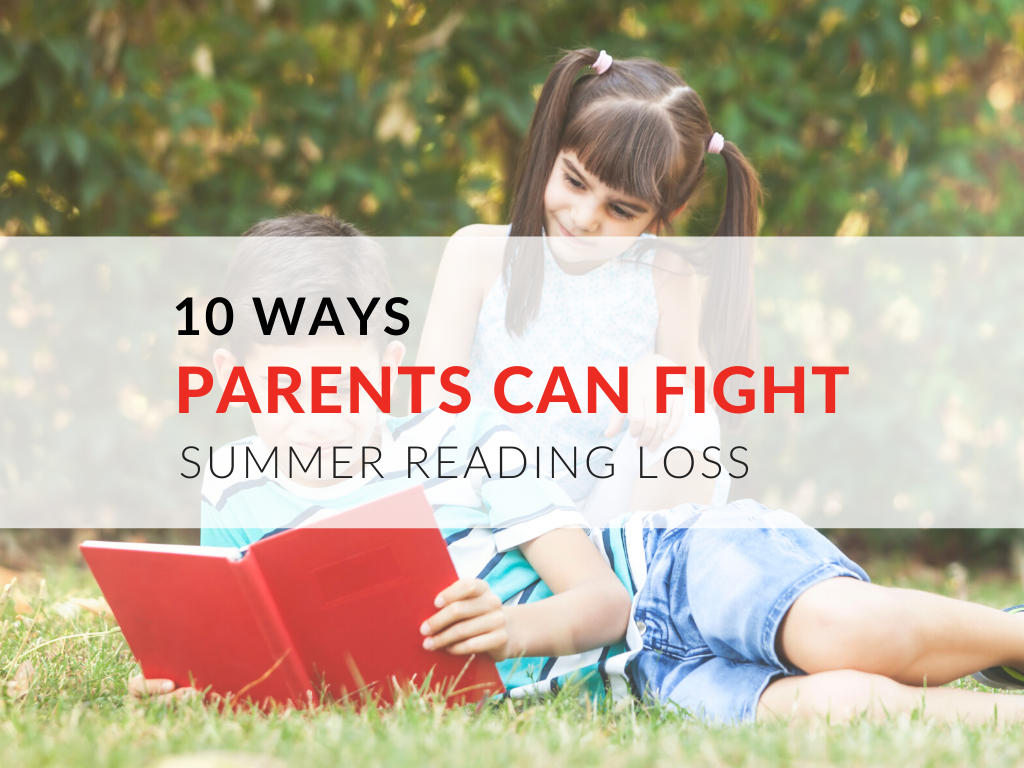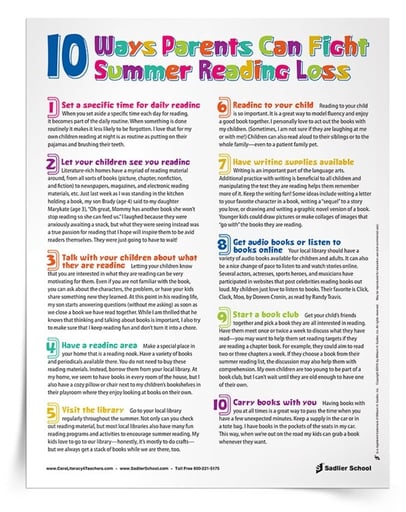May 29, 2020 CL Seasonal Activities Summer, ELA PD - Literacy, ELA K-5, ELA Focus - Reading, ELA Seasonal - Summer, ELA Resources - Tip Sheets, ELA PD - Other, Core Literacy
10 Ways Parents Can Prevent Summer Reading Loss
By: Erin Lynch
Parents are the key to keeping students reading over the summer. They are the frontline defense for fighting summer reading loss! In this post, we'll explore ten ways parents can keep students effectively AND happily reading while on summer break. Plus, download the 10 Ways Parents Can Fight Summer Reading Loss Tip Sheet.

Children that don’t read during their summer vacation can lose up to three months of reading achievement. Summer learning loss impacts reading fluency, vocabulary, comprehension, and more. Below are ten reading tips for parents to implement to keep students on track with summer reading.
Note: Educators need to recruit every parent to fight summer reading loss. So how do you do that? It’s simple — you print and pass out ideas for how parents can motivate kids to read over the summer!
10 Ways Parents Can Fight Summer Reading Loss
1. Set a specific time for daily reading
When you set aside a specific time each day for reading, it becomes part of the daily routine. When something is done routinely it makes it less likely to be forgotten. I love that for my own children reading at night is as routine as putting on their pajamas and brushing their teeth.
2. Let your children see you reading
Literature-rich homes have a myriad of reading material around, from all sorts of books (picture, chapter, nonfiction, and fiction) to newspapers, magazines, and electronic reading materials, etc. Just last week as I was standing in the kitchen holding a book, my son Brady (age 4) said to my daughter Marykate (age 3), "Oh great, Mommy has another book she won't stop reading so she can’t feed us." I laughed because they were anxiously awaiting a snack, but what they were seeing instead was a true passion for reading that I hope will inspire them to be avid readers themselves. They were just going to have to wait!
3. Talk with your children about what they are reading
Letting your children know that you are interested in what they are reading can be very motivating for them. Even if you are not familiar with the book, you can ask about the characters, the problem, or have your kids share something new they learned. At this point in his reading life, my son starts answering questions (without me asking) as soon as we close a book we have read together. While I am thrilled that he knows that thinking and talking about books is important, I also try to make sure that I keep reading fun and don’t turn it into a chore.
4. Have a reading area
Make a special place in your home that is a reading nook. Have a variety of books and periodicals available there. You do not need to buy these reading materials. Instead, borrow them from your local library. At my home, we seem to have books in every room of the house, but I also have a cozy pillow or chair next to my children's bookshelves in their playroom where they enjoy looking at books on their own.
5. Visit the library
Go to your local library regularly throughout the summer. Not only can you check out reading material, but most local libraries also have many fun reading programs and activities to encourage summer reading. My kids love to go to our library — honestly, it’s mostly to do crafts — but we always get a stack of books while we are there, too.
6. Reading to your child
Reading to your child is so important. It is a great way to model fluency and enjoy a good book together. I personally love to act out the books with my children. (Sometimes, I am not sure if they are laughing at me or with me!) Children can also read aloud to their siblings or to the whole family – even to a patient family pet.
7. Have writing supplies available
Writing is an important part of the language arts. Additional practice with writing is beneficial to all children and manipulating the text they are reading helps them remember more of it. Keep the writing fun! Some ideas include writing a letter to your favorite character in a book, writing a “sequel” to a story you love, or drawing and writing a graphic novel version of a book. Younger kids could draw pictures or make collages of images that “go with” the books they are reading.
8. Get audio books or listen to books online
Your local library should have a variety of audio books available for children and adults. It can also be a nice change of pace to listen to and watch stories online. Several actors, actresses, sports heroes, and musicians have participated in websites that post celebrities reading books out loud. My children just love to listen to books. Their favorite is Click, Clack, Moo, by Doreen Cronin, as read by Randy Travis.
9. Start a book club
Get your child's friends together and pick a book they are all interested in reading. Have them meet once or twice a week to discuss what they have read – you may want to help them set reading targets if they are reading a chapter book. For example, they could aim to read two or three chapters a week. If they choose a book from their summer reading list, the discussion may also help them with comprehension. My own children are too young to be part of a book club, but I can't wait until they are old enough to have one of their own.
10. Carry books with you
Having books with you at all times is a great way to pass the time when you have a few unexpected minutes. Keep a supply in the car or in a tote bag. I have books in the pockets of the seats in my car. This way, when we’re out on the road my kids can grab a book whenever they want.




